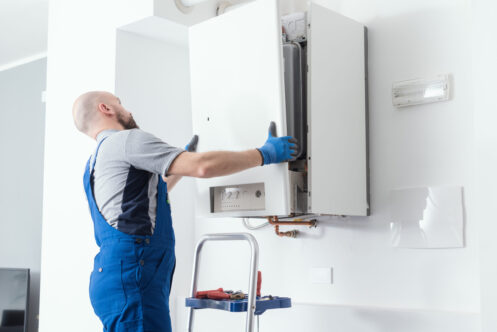
Boilers constitute a significant investment in your home’s energy efficiency and comfort. It is important to research the options available before deciding. With so many models and sizes of boilers available, it can be difficult to know which one is right for you. Learn more about what you should look for when purchasing a new boiler:
Efficiency
Boilers come in different levels of efficiency. Higher-efficiency boilers use less energy and are more cost-effective in the long run, so selecting one with a high-efficiency rating is important. However, when choosing a higher-efficiency boiler, factor in the additional installation costs associated with them. They can require more complex and extensive installation than lower-efficiency models.
Size
Accurate boiler sizing is critical for ensuring it runs efficiently and that your home receives enough heat. Boilers are sized by the number of BTUs (British Thermal Units) they can produce in an hour, so choose one large enough for your home. An undersized boiler may not provide adequate heat, and an oversized boiler will use more electricity than necessary, so it is important to get the size right. It’s best to trust a professional to help you determine the boiler size that your home needs.
Features
Modern boilers come with various features, from simple controls to more advanced digital ones. Consider the type of control you prefer and if any additional features are necessary. For example, some boilers come with built-in timers and temperature controls that can be programmed for different times of the day or week, while others come with smart home compatibility. Other features include flue gas heat recovery, condensate pumps, and low NOx levels. These features can be convenient and help you save energy and money in the long run.
Fuel Type
Boilers require different types of fuel to run, including natural gas, oil, propane, and electricity. When selecting a boiler, make sure the type of fuel it requires is compatible with your home and the level of energy efficiency you require. For example, electric boilers are more efficient than oil-fired models but may be more expensive. On the other hand, oil-fired boilers can be less expensive to run but will require more maintenance.
Warranty
Boilers typically come with a manufacturer’s warranty that covers the repair or replacement of the parts in case they malfunction. Make sure to read the warranty carefully and determine what it covers and for how many years. Also, check if the manufacturer offers an extended warranty or additional services such as annual maintenance or repairs.
Cost
As with any other major purchase, it is important to consider the price when selecting a new boiler. Boilers range in price depending on the efficiency rating, size, and features. Make sure to compare prices from multiple suppliers to ensure you are getting a good deal. Also, factor in any additional installation costs and the cost of long-term maintenance or repairs.
Brand and Type
Consider the brand and type of boiler you would like to purchase. Select a reliable brand with good reviews, as it will affect how long the boiler lasts and how it functions. Some brands have more advanced features and better warranties than others.
Also, consider the type of boiler you would like. There are three main types of boilers – combi, system, and regular – so select the one that best suits your needs. A combi boiler is ideal for homes that require hot water and central heating, while a system boiler is suitable for larger households with high demand for hot water. A regular boiler is best for homes with separate hot water and central heating systems.
Type of Venting
Boilers require ventilation to remove combustion gases from your home. Select the venting type compatible with the boiler you are purchasing, such as a direct vent, power vent, or chimney system. Direct vent systems are the most efficient, allowing maximum heat transfer from the boiler to your home. Power vents use a fan to draw air from the outside, while a chimney system uses an existing chimney to vent the gases.
By considering all the above, you will be able to make an informed decision when selecting a new boiler for your home. You should work with a professional HVAC company like Bratcher Heating & Air Conditioning, Inc. to ensure the installation is done correctly and your boiler functions optimally. We can help you with boiler installation and maintenance, heater installation and repair, AC installation and maintenance, geothermal installation, and indoor air quality services in Central Illinois. Contact Bratcher Heating & Air Conditioning, Inc. today to learn more!
